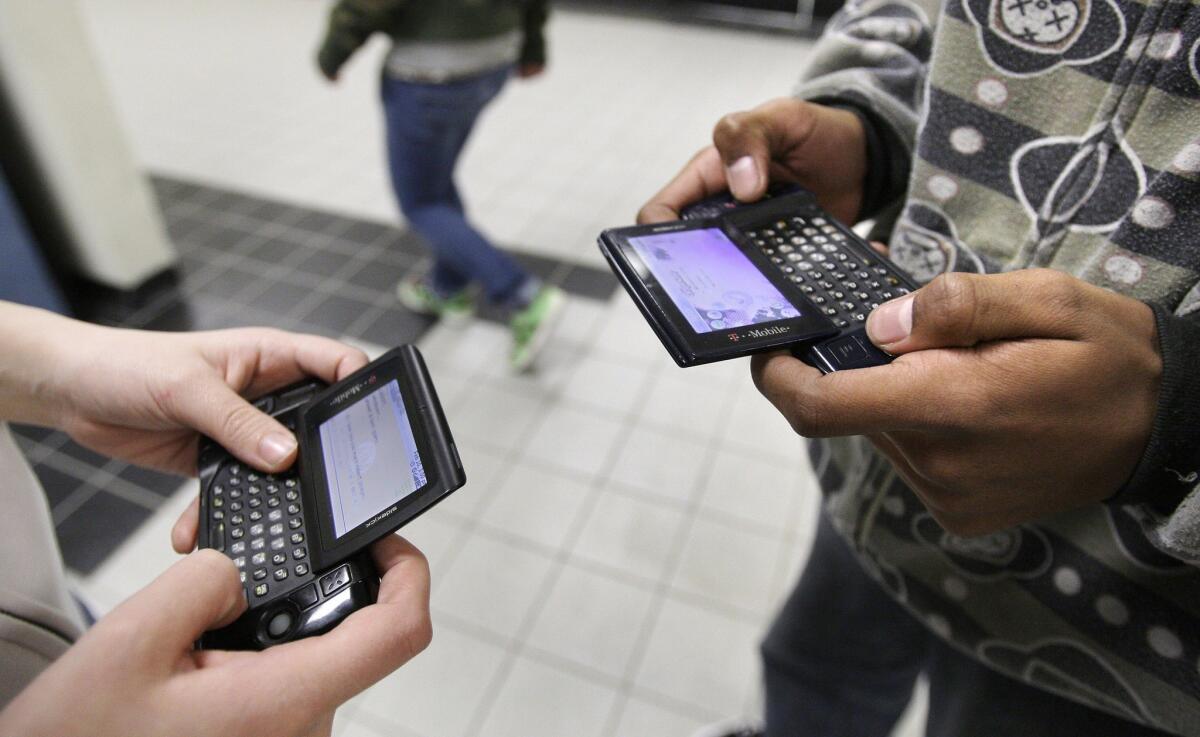OMG! Survey, like, says digital-savvy students are good at writing!

- Share via
Can kidz rite 2day?
Despite popular perceptions that the onslaught of texting, tweeting and other digital technologies is ruining students writing skills, a national survey of teachers released Tuesday found such advantages as greater creativity, personal expression and increased collaboration.
Teachers gave more than half their students grades of good to excellent for effectively organizing writing assignments, considering multiple viewpoints, synthesizing content from multiple sources, using appropriate style and tone, and constructing strong arguments in the survey by the Pew Research Center’s Internet & American Life Project.
But some teachers also worried about “creeping informality” in student writing. And they said more than two-thirds of their students had fair or poor abilities to digest long and complicated texts and understand plagiarism issues.
“The survey results challenge in some ways the idea that student writing is being undermined by increasing engagement with digital tools,” said Kristen Purcell, the Pew project’s associate director for research.
Those findings reflect the experiences of some Los Angeles teachers. Lisa Alva Wood, a Roosevelt High School English teacher who used iPads in her classroom this past year as part of an L.A. Unified test program, said the devices were a hit with students. She said they promoted a deeper interest in writing because students could see their works published in such online forums as https://www.figment.com.
“The kids were fascinated and excited about all the ways they could publish online and see their work and the work of others,” Alva said.
She added that digital tools, such as Google Docs, have increased collaboration among both students and teachers. Last year, she and a social studies teacher worked together on a sophomore writing project that they jointly monitored online and published through 826LA, a Los Angeles nonprofit writing and tutoring center.
Scott Mandel, who teaches English and history at Pacoima Middle School, said digital technology is “awesome” for finding teaching material, collaborating with such tools as Dropbox and enriching learning through online field trips to such places as the British Museum in London.
But he said the difficulty most middle school students have typing significantly detracts from the quality of their compositions, producing shorter sentences and less critical thinking. As a result, he said, he requires students to write first drafts by hand.
“Sometimes, good old-fashioned pen and paper are the best way,” said Mandel, who also oversees the school’s musical theater department.
In March and April of 2012, the center conducted an online survey of 2,462 middle and high school teachers of Advanced Placement classes and those involved with the National Writing Project, a national network of educators that aims to improve writing skills. The writing network and the College Board collaborated in the survey.
Some students said technology both helped and hurt their writing. Keilee Bessho, an incoming junior at La Cañada High School, said her texting sometimes carries over into formal writing, such as using a lowercase ‘i’ for the personal pronoun. But she said her iPhone has made it easier to look up vocabulary and class assignments.
Jared Yamasaki, a 16-year-old Valencia High School student, said texting abbreviations, such as “cuz” for “because” and “ya” for “yes,” has hindered his writing. He also said the auto-correct spelling feature on his iPhone has had a negative effect. “My spelling sucks,” he texted.
But, he added, “I guess that they all help involve writing in my life because idk [I don’t know] how much I’d write if I didn’t have texting and stuff.”
Indeed, some teachers told Pew researchers that texting and other digital writing serve as useful “building blocks” for students to start expressing ideas. English teachers were far more positive toward digital tools for writing — nearly two-thirds said it made teaching easier — than colleagues teaching math, science and social studies.
In the end, however, technology is not the most important element in promoting good student writing, Alva said.
“Technology is neither here nor there; it’s still in the hands of the teacher,” she said.
More to Read
Sign up for Essential California
The most important California stories and recommendations in your inbox every morning.
You may occasionally receive promotional content from the Los Angeles Times.










